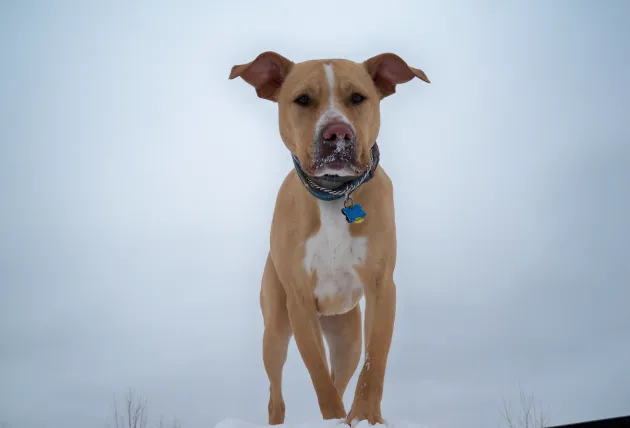7 Safety and Sanity Tips for Enjoying the Holidays With Your Pets
While enjoying the holiday season, remember, not everything people enjoy is going to be safe for our beloved pets.
M. Leanne Lilly, DVM, DAVCB, assistant professor, Department of Veterinary Clinical Sciences, shares some recommendations on how to keep your pets safe this holiday season.

Try to maintain a consistent and predictable daily schedule. With many people working from home, this may be easier even if you have time off. This primarily includes the items that involve your pets- wake time, feeding times, play times.
Pet-proof your holiday decorations and block your pets’ access to them when you are not supervising them. Put a flexible pen around the Christmas tree and/or presents, make sure cats especially cannot access live-candle menorahs. Not only is it a stressor for you to clean up, but ornaments, tinsel and electrical cords and gifts can look like toys; they can be dangerous to pets if chewed. If you have pets in the house, avoid food-based ornaments such as popcorn, candy canes, etc. Unplug your lights when not supervising your pets around them, vs just turning them off if they have access to the cords. This allows you to avoid electrical burns.
Use enrichment items (such as these for dogs and these ones for cats) to make holiday items less appealing. For cats, this may be the perfect time to increase the amount of non-Christmas tree perching places with a gift to your feline of additional cat trees or shelves.
Block your pets’ access to holiday plants: mistletoe, poinsettia plants, lilies are all potentially toxic. Do not let them drink water at the base of live Christmas tees- the preservatives are toxic. Instead, increase water access in other areas by using a fountain.
Holiday human treats can also be risky for pets. Foods like chocolate, garlic, onions, macadamia nuts, grapes, raisins are toxic. Fatty foods like drippings can cause pancreatitis and leftover bones can be a risk as well. If your pet ingests these things it can highjack your holidays with a trip to the veterinary ER. Instead, block your pet’s access to food areas if not supervised or give them pet-appropriate high value food toys, such as canned food in a Kong™, to keep them occupied. Remember that your guests, if you are having them indoor or outdoor this year, may not know what foods are toxic to pets. Inform them ahead of time, separate the pets, or avoid serving non-pet safe foods.
While holiday gatherings may look different this year (masked, limited numbers, outdoors) if you choose to have gatherings in your home, remember that your pet may not be comfortable with visitors. If this is the case, separating them in a quiet room with toys and food items, or boarding them may be safest for all involved. Even if your pet adores guests, high amounts of traffic through the front door, or fence gates can result in wandering or lost pets. Use a dual barrier system in this case such as a baby gate or having your pet on leash.
If you are traveling to friends’ or family’s home, consider the pets who already reside there and their preferences, as well as whether your pets want to travel. Many pets find travel anxiety producing, even if they do not also have to contend with entering another pet’s home-territory. They may feel more secure with a pet-sitter, boarded or for short visits, left at home. You can always bring their presents home after the fact.
Despite taking precautions, sometimes accidents do happen. The Ohio State Veterinary Medical Center is open 24 hrs a day, seven days a week, 365 days a year for companion animal, farm animal, and equine emergencies. Our Dublin Urgent Care is open 4 p.m.- 11 p.m. seven days a week, and holidays 11 a.m. to 11 p.m.
If your animal needs emergency treatment, please call 614-292-3551 (for companion animals like dogs and cats) or 614-292-6661 (for equine and farm animals).